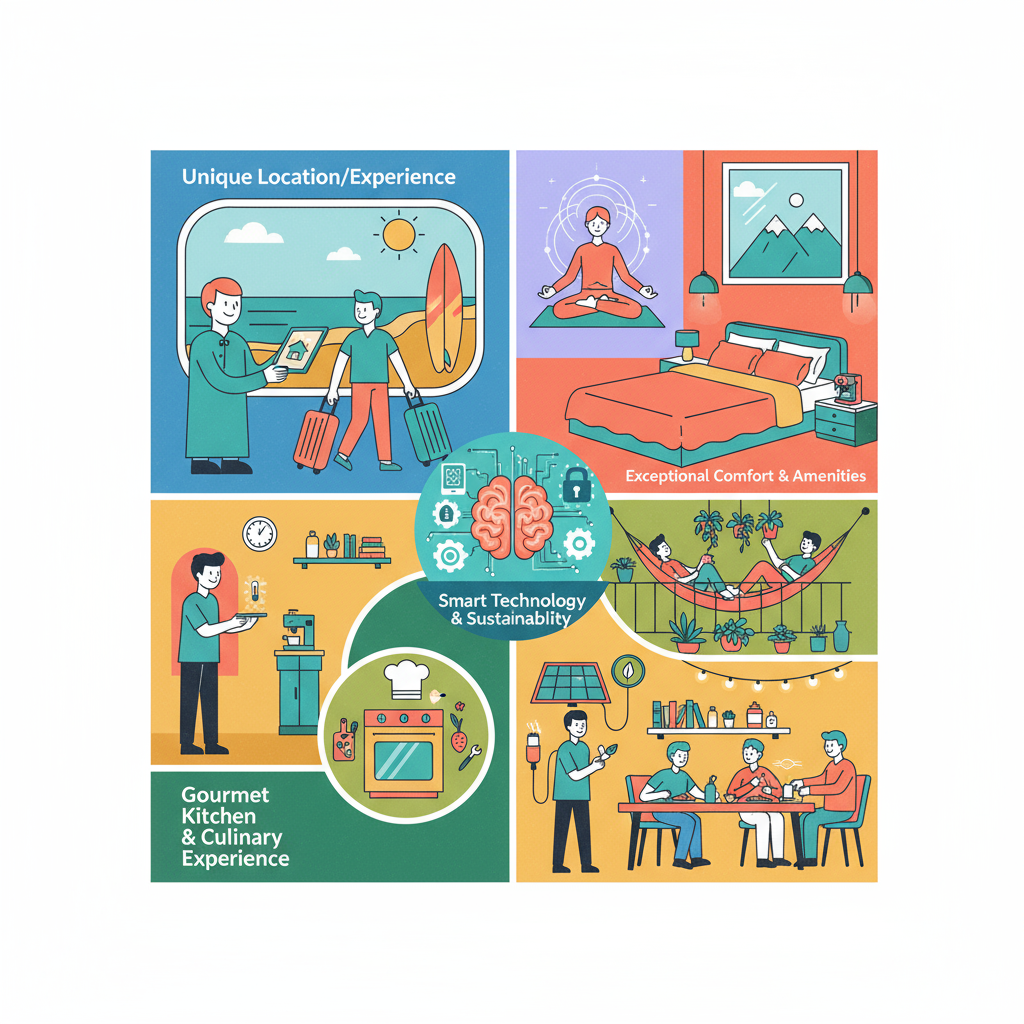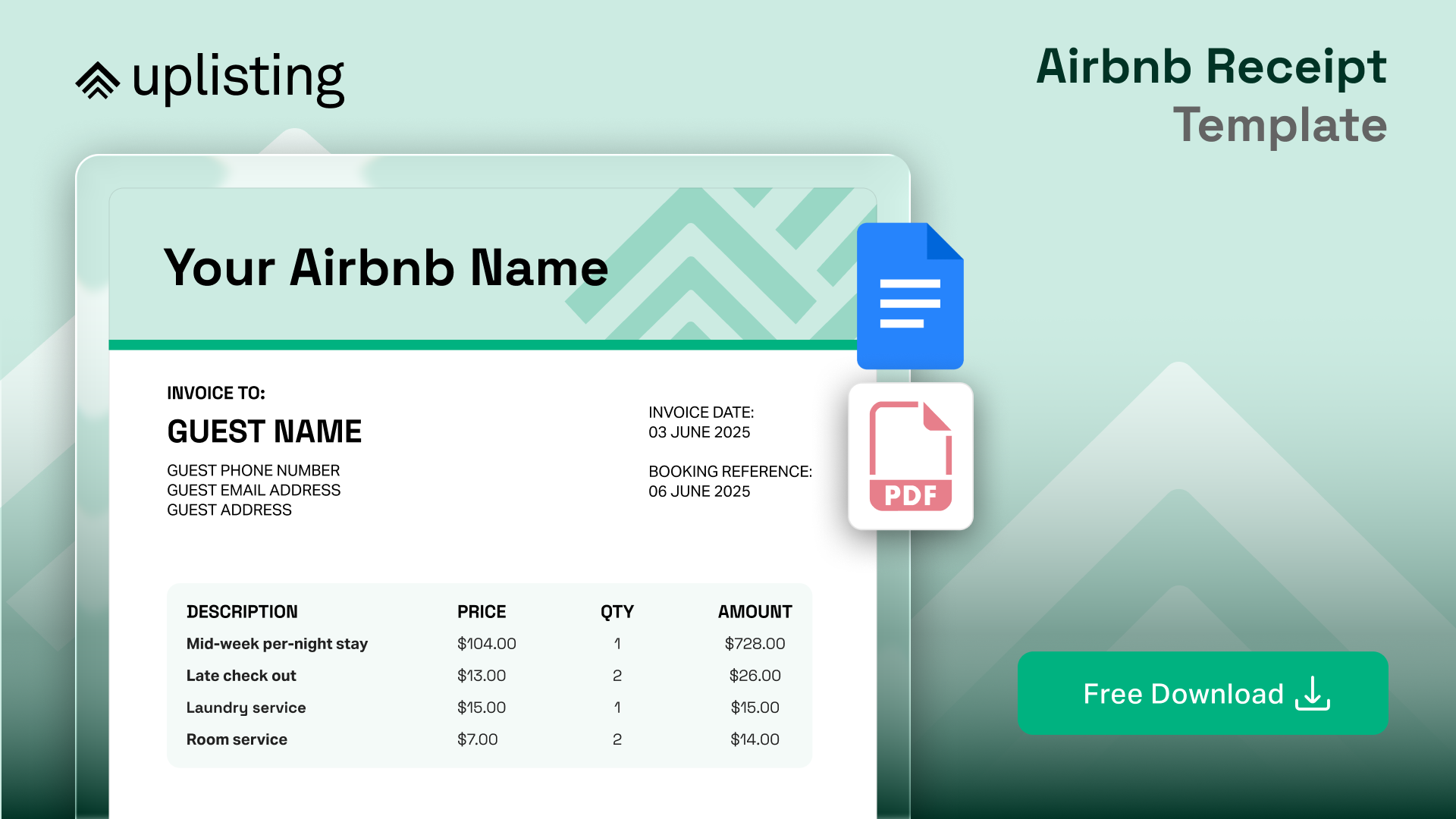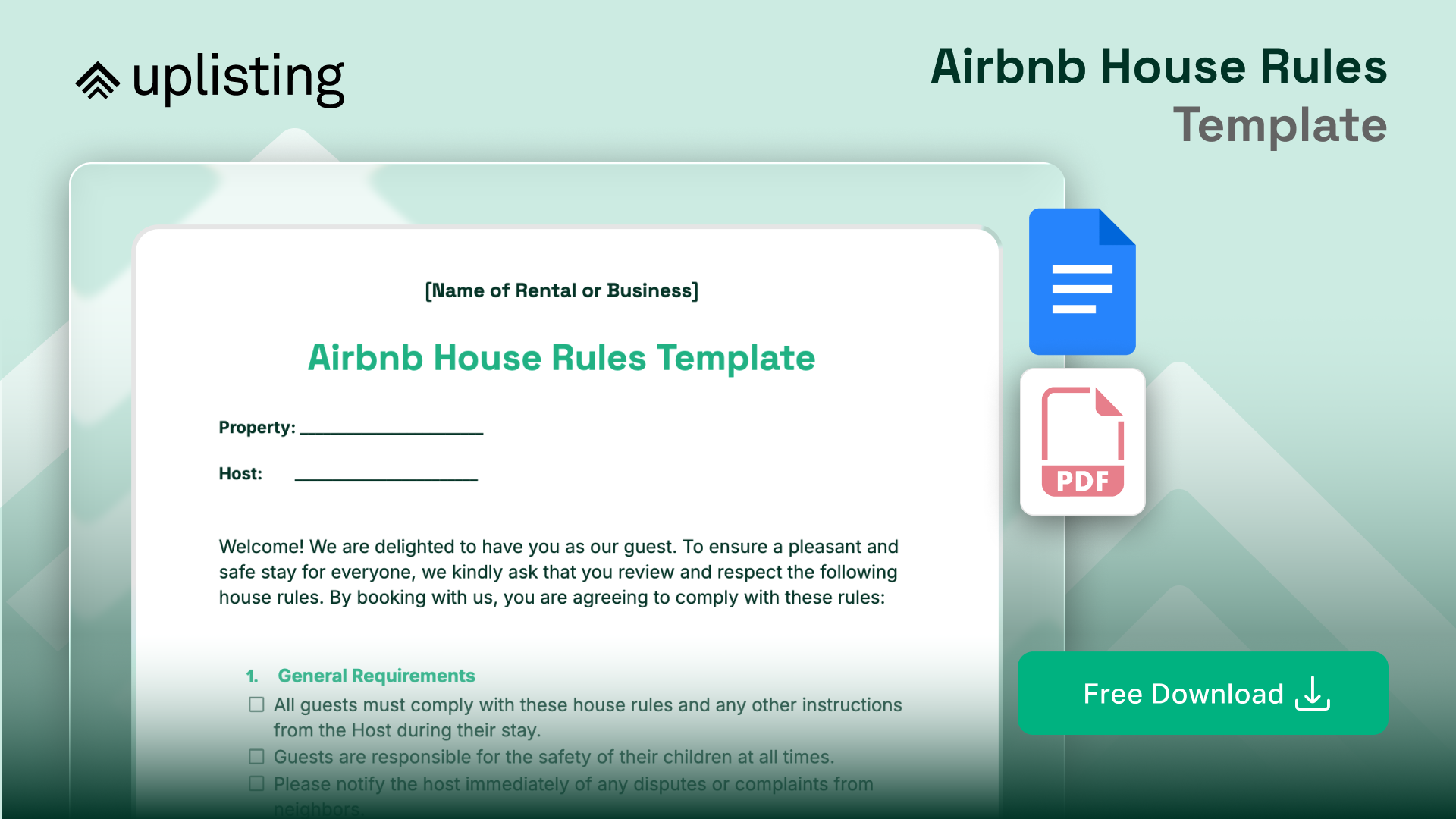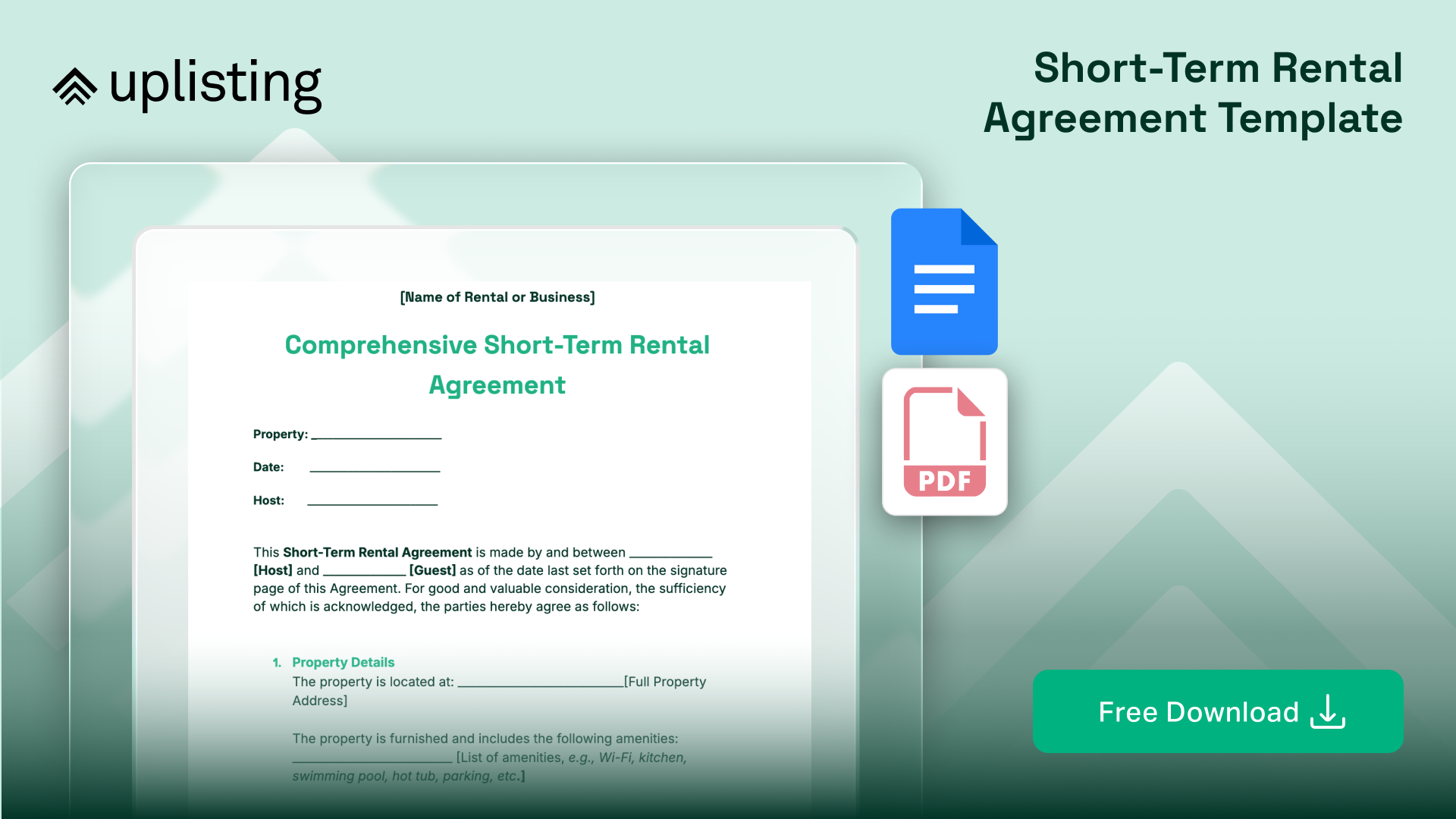Key Takeaways
Time commitment depends on property size, guest turnover, and how much you automate.
On average, managing an Airbnb can take anywhere from a few hours a week to several hours a day.
Tasks include guest communication, cleaning coordination, maintenance and marketing.
According to AirDNA, the average Airbnb listing hosts around 20–30 nights per quarter, which translates into multiple turnovers, guest communications and on-the-ground tasks.
Sounds easy, right? Well, that number sounds manageable... Until you're fielding late-night questions, coordinating cleaners and double-checking calendar syncs across platforms.
The truth is that many new hosts underestimate the time it takes to manage an Airbnb, especially when aiming for 5-star reviews and repeat bookings. Without a streamlined system, this work adds up fast.
This guide breaks down what managing an Airbnb actually involves, how much time it demands depending on your setup and what steps you can take to make it more efficient.
The Main Tasks Involved in Managing an Airbnb
Managing a short-term rental is more than handing over keys and hoping for a five-star review. It’s a constant cycle of guest care, daily logistics, and keeping every detail from slipping through the cracks.
So when someone asks how much time does it take to manage an Airbnb, the answer depends on how each task gets handled, and how much of your day it takes over.
Guest comms
Guest messages don’t follow a schedule. They come in before sunrise, after dinner, and right in the middle of your day job.
Hosts usually respond to:
Booking confirmations and check-in instructions
Mid-stay questions about appliances, noise, or local recommendations
Issues that need fixing during a stay
Review prompts, thank-you notes, or refund requests after checkout
Airbnb expects replies within an hour. Delays sink response scores and push listings further down in search. So hosts either stay glued to the inbox or automate where possible to avoid missing a message.
Turnovers and cleaning coordination
Every guest checkout flips a switch. Now it’s time to clean, reset, restock, and make the space spotless again.
Turnovers mean checking supplies, confirming cleaner schedules, and making sure no one walks into an unmade bed.
Time often goes into:
Matching cleaner availability with back-to-back bookings
Checking that supplies like paper towels, soap, and coffee are replenished
Adjusting for early checkouts or late arrivals
Following up when something gets missed or damaged
Even with a reliable cleaner, coordination still lands on the host. Managing more than one property? Now you’re juggling multiple calendars, crew schedules, and property standards every week.
Listing management and pricing updates
Market conditions shift, seasons change, and guest expectations evolve. A description that worked last year might feel outdated now. A static price in a dynamic market leaves money on the table or drives guests to other listings.
Ongoing tasks include:
Syncing calendars across Airbnb, Vrbo, and direct booking sites
Adjusting pricing for holidays, events, or slow seasons
Updating listings with new amenities, rules, or photos
Testing titles or photo orders to increase clicks and views
For hosts on multiple channels, even simple edits can become a repetitive loop. One wrong update in one place creates confusion everywhere else.
Maintenance and problem solving
Anything inside a property can break. Guests unplug routers, garbage disposals jam, and batteries die in the middle of the night. The host gets the call. And unless there’s a local team on standby, the fix usually falls on the person who knows the property best.
Tasks often include:
Scheduling HVAC tune-ups, pest control, and plumbing checks
Responding to problems during a guest’s stay
Coordinating with handymen, electricians, or delivery services
Keeping backup supplies like sheets, batteries, and light bulbs stocked
Staying ahead means regular walk-throughs, building a trusted local team, and keeping track of recurring problems before they affect guests. A single broken lock or water leak can derail an entire weekend booking, so fast response times aren’t optional.
Save yourself from your inbox
Automate with Uplisting
Automated guest messages keep your guest informed from booking through to check-out. They’re designed to answer questions before they arise, saving you time whilst keeping your guests happy.
How Much Time It Takes for Different Hosting Styles
There’s no one-size-fits-all answer to how much time it takes to manage an Airbnb.
A private room in your home doesn’t demand the same attention as a standalone mountain cabin. Some hosts check in once a week; others feel like they're running a hotel with a never-ending guest list. The way you structure your hosting setup shapes how much of your day gets pulled into short-term rental management.
Single spare room vs. full property
Hosting a spare bedroom where you already live can feel manageable at first. You’re nearby, already handling basic cleaning, and available when guests have questions. But living on-site means guests often expect more interaction, directions, dining tips, or help with TV remotes. You’re not just the host. You’re the front desk.
Running a full rental property, especially one off-site, adds more layers. You’ll manage everything from keyless entry hardware to supply restocks. More space means more furniture, more cleaning, and more chances something breaks. A one-bedroom condo might take under two hours to flip between guests. A five-bedroom vacation rental? Plan for a full-day reset or hire someone who can!
Part-time vs. full-time hosting
Balancing hosting with another job means squeezing tasks into nights and weekends. That approach works until a guest gets locked out during your meeting or a cleaner cancels an hour before check-in. Without a system in place, stress builds fast.
Full-time hosts treat short-term rentals like a business, because they are. They respond faster, automate what they can, and streamline everything from check-in to review follow-ups.
High-turnover city listings vs. low-turnover vacation homes
City rentals booked for two or three nights at a time mean quick turnovers, constant messaging, and tight cleaning windows. There’s always another guest around the corner, and any delay ripples into the next reservation. The pace is fast, but occupancy stays high.
Vacation homes with longer stays move slower. Fewer turnovers mean fewer cleanings, but guests staying a week or more often expect better amenities, clearer instructions, and a more polished experience overall. If the property is remote, you’ll either need to drive out or rely on a local team to do walkthroughs, handle deliveries, and restock supplies.
So when someone asks how much time does it take to manage an Airbnb, the better question is: how are you hosting, and what kind of operation are you running? Your model shapes your schedule more than the number of listings ever will.

The Hidden Time Costs of Hosting
Plenty of work goes into managing an Airbnb that doesn’t show up on a calendar.
Late-night messages and emergencies
A guest can’t find the lockbox at 11:45 p.m. Another hears a smoke alarm chirping at 2 a.m. because the battery’s low. A toilet clogs minutes before checkout.
Even without fixing the issue yourself, you still have to answer the call, talk a guest through a reset, or coordinate with someone who can help.
The work doesn’t stop after check-in. You just get better at predicting what could go wrong and setting up guardrails to stop it before it does.
Handling reviews and feedback
Replying to guest reviews sounds simple, until a four-star rating drops your average or a guest leaves a half-true complaint that sticks to your listing like glue. Responses take time, especially when protecting the reputation of your property.
A well-written reply reassures potential guests browsing your listing tomorrow. One clumsy message can undo months of great service, even if the stay went smoothly.
Restocking supplies and amenities
Running out of paper towels or coffee pods once is frustrating. When a guest arrives to an empty cabinet, now it’s a problem. Keeping a rental stocked means tracking supplies you don’t see every day, like extra linens, dish soap, toilet paper, batteries.
If you live nearby, you’re often the one grabbing last-minute items. If you manage remotely, you’re counting on someone else to notice what’s missing and fix it before the next arrival. Either way, staying stocked means constant attention to tiny details that rarely get noticed until something’s gone.
Admin: taxes, permits, and accounting
The least visible work happens behind the scenes, license renewals, income tracking, occupancy tax filings. Local rules change, portals break, and receipts go missing. Even with software, someone still needs to double-check numbers, reconcile payouts, and keep up with tax deadlines.
Enjoy the confidence & focus you need to scale your vacation rental business
Book more while doing less
With a reliable VRM solution you can trust, Uplisting can help you grow your business without wasting time on double bookings, unhappy guests, upset clients and worrying what could go wrong next.
How Automation Changes the Time Equation
Repetitive tasks are what drain most hosts, not the size of the property.
For anyone asking how much time does it take to manage an Airbnb, the difference between a manual setup and an automated one can mean the difference between a manageable operation and a constant scramble.
Scheduled messages and auto-replies
Most guest communication follows a standard pattern. Every stay needs check-in instructions, Wi-Fi details, and a polite reminder to leave a review. Instead of rewriting that message every single time, you can schedule it once and be done.
Auto-replies cover you when you're asleep, in a meeting, or anywhere without your phone. If a guest asks for the Wi-Fi password at 1 a.m., they get the information instantly, so there's no hit to your response time metrics, which directly affect where your listing appears in search.
Smart locks and self check-in
Handing over keys in person takes energy and flexibility you probably don’t have.
Smart locks or keypads give guests the freedom to check in when they arrive, without waiting for anyone to meet them. No more driving across town or coordinating arrival windows.
You can set time-specific entry codes that expire automatically. Guests get in. You stay home. Everyone wins!
With fewer interruptions and fewer late-night questions, self check-in quickly becomes the default.
Dynamic pricing tools
Manually adjusting rates may work for a single listing with plenty of downtime, but pricing needs to move with demand: weekends, local events, holidays, even weather forecasts.
Automated pricing tools track changes across the market and adjust your rate daily to keep your listing competitive.
PMS and channel managers for scaling
Running more than one property without a property management system feels like flying blind. A PMS pulls everything into one view, includingreservations, calendars, messages, and cleaning schedules.
Channel managers sync Airbnb, Vrbo, and direct booking sites, so when one calendar updates, every platform reflects the change instantly. You get a single dashboard, fewer mistakes, and far less time spent chasing problems that software can handle.
For hosts managing up to five properties, a solid system takes work off your plate before it ever lands there.
Outsourcing and Support Options
As bookings stack up, guest messages multiply, and cleaning windows shrink, handing off parts of the operation becomes the only way to stay ahead.
Hiring cleaners and maintenance staff
Most hosts start by hiring a cleaner because it’s the quickest win. A dependable cleaner doesn’t just mop floors and change linens. They flag damage, restock basics like toilet paper and dish soap, and send photos after each turnover. With the right checklist and clear expectations, you can hand off the entire reset process and know it’s done right.
Maintenance takes a little more work. You might not need someone on-call full-time, but you’ll want a go-to handyman who can deal with clogged drains, flickering lights, or jammed locks on short notice. Build a contact list with a plumber, electrician, pest control pro, and general repair tech. Prioritize people already working with short-term rentals; they know how fast things move and won’t ghost you before a Saturday check-in.
Co-hosts and assistants
When you’re stretched between properties (or just tired of being online 24/7) a co-host or part-time assistant can take over the daily grind. Co-hosts manage guest messaging, turnovers, and calendar tweaks. They’re especially useful for remote properties where you can’t check in personally or fix problems on-site.
Some hosts prefer virtual assistants for inbox and pricing tasks, while others hire local help to drop off supplies, walk through the space after guests leave, or prep for upcoming arrivals. You’re not handing off the entire business, you’re just carving out the parts that eat up your time but don’t need your personal attention.
When to bring in professional management
Working with a full-service management company means giving up control in exchange for time. They handle bookings, pricing, guest support, turnovers, and maintenance. You just monitor the dashboard, review monthly reports, and stay plugged in enough to make decisions.
Professional management makes sense when:
You live far from the property and can’t respond quickly
You’re managing several listings and running out of hours in the day
You want to scale up without hiring your own team
You’re tired of being the one who answers every late-night phone call
Even with a manager in place, you’re still responsible for keeping the business on track.
So automatic, you won’t know what to do with yourself
Put my rentals on autopilot
It’s simple to automate repetitive tasks with Uplisting's short-term rental software. You’ll save hours every week and eliminate human error. Go ahead — take some time off.
Save Time Managing Your Airbnb with Uplisting
Managing an Airbnb effectively takes more time than most new hosts expect.
The good news? You don’t have to do it all manually. Automation, smart tools, and the right level of support can reduce your workload significantly while improving the guest experience.
Whether you’re hosting a single unit or managing a growing portfolio, staying efficient is what keeps your rental business sustainable...and scalable.
If you're ready to spend less time on repetitive tasks and more time growing your business, sign up for Uplisting to streamline your vacation rental management. With automation, channel syncing, and unified guest messaging, Uplisting gives you back control, without the chaos.
Frequently Asked Questions About Managing an Airbnb
What happens if I can’t respond to guests quickly enough?
Airbnb tracks how quickly you reply down to the minute. Delays can push your listing lower in search results and trigger response rate warnings right on the page.
Setting up auto-replies for common questions like parking, Wi-Fi, or check-in details keeps your response time sharp, even when you're off the clock. A co-host can also back you up during busy hours or while you're juggling other bookings.
Can I handle multiple properties by myself?
You can, but it gets time-heavy fast without support. Managing bookings, calendars, pricing, and messages across separate platforms starts to feel like a full-time job.
A centralized system keeps your operations clean and cuts down on daily repeat work. If you're managing two or more properties, a strong setup makes the difference between being in control and constantly playing catch-up.
Do long-term stays reduce time spent managing?
Longer bookings mean fewer turnovers and less back-and-forth about check-in or cleaning. That sounds easier, but longer stays also bring different expectations. Guests might want more supplies, faster responses, or help with minor maintenance during their stay.
You’ll spend less time cleaning, but more time setting expectations and checking in mid-stay. Adjusting your minimum night requirements can help balance effort with income, especially if you're looking to cut down on constant turnovers without losing revenue.

















.png)

